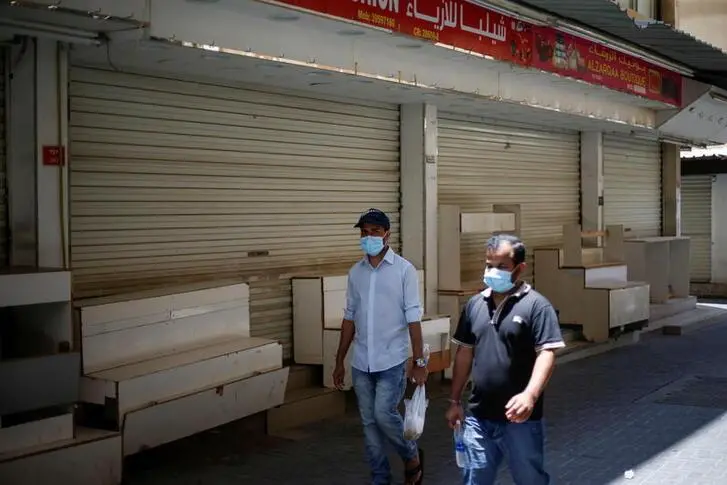PHOTO
Bahrain's success story in combating the coronavirus (Covid-19) pandemic was highlighted during a major regional medical conference in the kingdom yesterday.
However, despite the low number of active Covid-19 cases, there are between 150,000 to 200,000 people in Bahrain suffering from long-Covid symptoms, according to a senior Bahraini medic.
Infectious Diseases Consultant and Microbiologist at the BDF Hospital and National Taskforce for Combatting Covid-19 monitoring committee head Lieutenant Colonel Dr Manaf Al Qahtani was discussing the major developments and phases in tackling the pandemic at Manama Health 2022 (Exhibition and Conference).
The four-day event, which concluded yesterday, was held under the patronage of Supreme Council of Health chairman Lieutenant General Dr Shaikh Mohammed bin Abdulla Al Khalifa, at the Gulf Hotel Convention Centre.
Around 130 international speakers and 70 exhibitors including hospitals, pharmaceutical companies, universities, training institutes and government entities took part.
“During any pandemic you need to project when you’re going to have the peak, the status quo and the endemic phase,” said Dr Al Qahtani.
“To establish an out-patient programme you need to start when the ICU admissions are below 20 per cent and the overall admissions be less than 10pc,” he added.
“The rationale behind the out-patient programme is to provide therapeutic treatment to prevent complications and not overwhelm hospitals.
“We have been lucky by segregating Covid-19 and non-Covid cases; in other countries general hospitals were overwhelmed by cases and they had to suspend major services.
“In Bahrain, we never stopped major services; we only stopped elective procedures in the early phases of the pandemic.”
He said Bahrain saw a surge of Covid-19 cases during three specific phases.
“We had three big waves: Alpha (which arrived from the UK by 2020-end), Delta (from April 2021 to August 2021) and Omicron (from the beginning of December 2021 to date).
“The biggest surge we had was during Omicron.”
During the Alpha phase, less than 20 per cent of Bahrain’s eligible population was vaccinated, which went up to 50pc during the Delta phase and 80pc during the Omicron phase by which time 79pc to 80pc had also received the first booster shot.
“Bahrain is currently in the endemic phase – the pandemic isn’t over as variants continue to emerge and the virus mutates – and strategies are in place to tackle this.
An endemic phase is when a disease spreads in a community at the normal or expected level.
“In Bahrain, we have the lowest hospitalisation – below 1pc – and the lowest ICU admission for almost six months. Currently, we have only two patients in the ICU and 13 Covid-related admissions despite the fact that we have the most transmissible variant, ” added Dr Al Qahtani.
“Vaccinations, social distancing and therapeutics are the public health tools that lower the severity of the pandemic.”
He said that during mid-2021 Bahrain started implementing the out-patient programme resulting in the lowest levels of hospitalisation and deaths during the Omicron phase despite having the highest level of infections.
“As of today I can say that around 45pc of the entire population had at least one episode of infection, and around 9pc of those had more than one infection as our re-infection rate in Bahrain is 9.1pc.
“We have the lowest ICU admission and hospitalisation and most of the people who are infected are at home.
“We reached this stage because 82pc are vaccinated and of those 80pc have received at least one booster dose.”
The medic said that most of the patients prefer an out-patient clinic aimed at preventing and monitoring the long-Covid, which, he reaffirmed, is a true syndromic disease.
People with post-Covid (or long-Covid) can display a wide range of symptoms that last more than four weeks or months after infection including fatigue, fever, difficulty in breathing, chest pain, heart palpitations, sleep problems, dizziness, brain fog, headache and depression or anxiety.
“We anticipate that there are between 150,000 to 200,000 people in Bahrain who might suffer from long-Covid and if we don’t provide a dedicated programme we will be stuck.
“We are the first country in the region to start an out-patient clinic in May 2021 as we needed to get ahead of this real and existing problem before it explodes.
“Those who had one Covid-19 infection are at risk of developing long-Covid and that is the reason behind the out-patient clinic – to capture these cases, study them and respond accordingly.”
reem@gdnmedia.bh
© Copyright 2022 www.gdnonline.com
Copyright 2022 Al Hilal Publishing and Marketing Group Provided by SyndiGate Media Inc. (Syndigate.info).





















